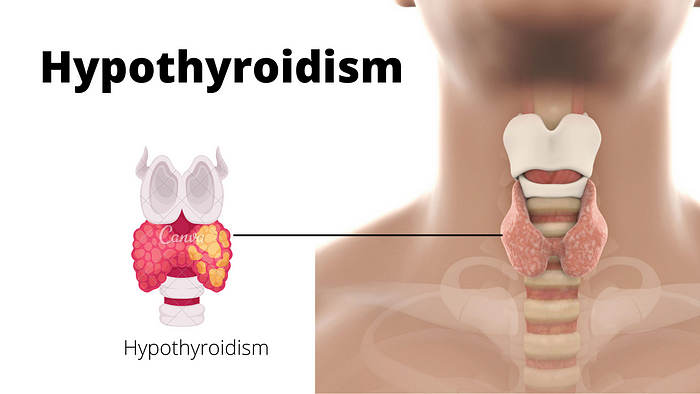Hypothyroidism: Symptoms, Causes and Treatment of Hypothyroidism

Hypothyroidism is a disease in which the thyroid gland cannot produce enough thyroid hormone. Since the main purpose of thyroid hormone is to “control the body’s metabolism”, it is understandable that people with this disease will have symptoms related to slow metabolism.
Symptoms of Hypothyroidism
Thyroid hormones affect more than one organ system, so the signs and symptoms of hypothyroidism are diverse.
The thyroid creates thyroid hormones, triiodothyronine (T3) and thyroxine (T4). These alter metabolism, and they also affect the subsequent functions:
- muscle strength
- pores and skin dryness
- menstrual cycles
- weight
- brain development
- breathing
- heart and nervous system functions
- body temperature
- cholesterol levels
Symptoms of hypothyroidism generally include, however, aren’t limited to:
- fatigue
- weight gain
- cold intolerance
- slowed heart rate, movements, and speech
- thin, brittle hair or fingernails
- reduced sweating
- pins and needles
- heavy periods, or menorrhagia
- weakness
- excessive cholesterol
- puffy face, feet, and hands
- insomnia
- joint and muscle pain, cramps, and weakness
- constipation
- dry pores and skin
- stability and coordination issues
- lack of libido
- recurrent urinary and respiratory tract infections
- anemia
- depression
If left untreated, the following signs can manifest:
- hoarseness
- puffiness in the face
- thinned or lacking eyebrows
- slow heart rate
- hearing loss
If it develops in children or teenagers, the signs and symptoms are generally similar to adults.
However, they will also experience:
- bad growth
- delayed development of teeth
- poor mental improvement
- delayed puberty
Hypothyroidism develops slowly. Symptoms may work unnoticed for an extended time, and they will be vague and general.
Symptoms vary a wonderful deal among individuals, and they’re shared through different conditions. The best way to obtain a concrete analysis is through a blood test.
Causes of Hypothyroidism
When your thyroid does not produce sufficient hormones, the stability of chemical reactions to your body may be upset. There may be some of the reasons, inclusive of autoimmune disease, hyperthyroidism treatments, radiation therapy, thyroid surgical operation, and certain medicines.
Your thyroid is a small, butterfly-shaped gland located at the base of the front of your neck, simply under your Adam’s apple. Hormones produced through the thyroid gland — triiodothyronine (T3) and thyroxine (T4) — have a giant impact on your health, affecting all factors of your metabolism. These hormones also have an impact on the control of critical functions, along with body temperature and heart rate.
Hypothyroidism results whilst the thyroid gland fails to produce sufficient hormones. Hypothyroidism can be due to some of the factors, inclusive of:
Autoimmune disease: The most common reason for hypothyroidism is an autoimmune disease referred to as Hashimoto’s thyroiditis. Autoimmune problems occur when your immune system produces antibodies that assault your personal tissues. Sometimes this technique involves your thyroid gland.
Scientists are not sure why this happens, but it is probably a combination of factors, along with your genes and an environmental trigger. However it happens, those antibodies have an effect on the thyroid’s capacity to produce hormones.
Over-response to hyperthyroidism treatment: People who produce an excessive amount of thyroid hormone (hyperthyroidism) are frequently treated with radioactive iodine or anti-thyroid medicines. The aim of those treatments is to get thyroid function lower back to normal. But sometimes, correcting hyperthyroidism can end up reducing thyroid hormone production an excessive amount, resulting in permanent hypothyroidism.
Thyroid surgery: Removing all or a big part of your thyroid gland can diminish or halt hormone production. In that case, you will want to take thyroid hormone for life.
Radiation therapy. Radiation used to deal with cancers of the head and neck can have an effect on your thyroid gland and might lead to hypothyroidism.
Medications: A variety of medicines can contribute to hypothyroidism. One such remedy is lithium, which is used to deal with certain psychiatric disorders. If you take medication, ask your health practitioner about its impact on your thyroid gland.
Less frequently, hypothyroidism may also result from one of the following:
Congenital disease: Some toddlers are born with a defective thyroid gland or no thyroid gland. In most cases, the thyroid gland did not increase normally for unknown reasons, however, a few children have an inherited form of the disease. Often, babies with congenital hypothyroidism seem normal at birth. That’s one reason why maximum states now require new child thyroid screening.
Pituitary disorder: An exceedingly rare cause of hypothyroidism is the failure of the pituitary gland to produce sufficient thyroid-stimulating hormone (TSH) — commonly due to a benign tumor of the pituitary gland.
Pregnancy: Some ladies develop hypothyroidism during or after pregnancy (postpartum hypothyroidism), frequently because they produce antibodies to their personal thyroid gland. Left untreated, hypothyroidism will increase the risk of miscarriage, premature delivery, and preeclampsia — a situation that causes a considerable rise in a woman’s blood pressure over the past 3 months of pregnancy. It also can severely have an effect on the growing fetus.
Iodine deficiency: The trace mineral iodine — discovered primarily in seafood, seaweed, plants are grown in iodine-rich soil and iodized salt — is important for the production of thyroid hormones. Too little iodine can result in hypothyroidism, and an excessive amount of iodine can worsen hypothyroidism in those who have already got the situation. In a few parts of the world, iodine deficiency is common, however, the addition of iodine to table salt has genuinely removed this problem in the USA.
Read Full Article
